 Climbers on Mt. Everest at the base of the Hillary Step.
Climbers on Mt. Everest at the base of the Hillary Step.
It Always Seems Impossible Until It’s Done
Greetings, Dear Reader. I’m dictating this blog entry while walking on my treadmill, so please excuse me if I ramble or my “smart” phone substitutes incorrect homophones (e.g., “there, their, they’re”). As you’ll soon read, I have a lot going on and need to multitask.
I think it’s been over a year since I last wrote on my blog, and I’ve done so much work during this period that I can’t enumerate everything I’ve done. Here are the broad strokes:
I finished the fourth draft of all nine episodes of my teen epic or episodic novel Bodaciously True & Totally Awesome (it’s one gigantic novel of 1.2 million words split into nine parts); I reread and made the final revisions to Episode I: Bad Boy; I created and continually updated a detailed spreadsheet with checklists of all of the tasks to be accomplished for each book; with my wife and Muse’s help, I launched a crowdfunding campaign to raise money for the promotion and publication of the books; I hired and gave creative direction to a phenomenal graphic designer, who has created all nine eBook covers and will be creating the covers for the hardcover books and the trade paperbacks as I complete the typesetting of each one; in the past 5 weeks, I taught myself Adobe InDesign (with some largely useless “help” from AI), created a book template for all nine books, and typeset the first episode (which is looking friggin’ money by the way); contacted multiple publicity, marketing, and other book promotion and sales professionals, one of whom ghosted me and another who proved to be a mountebank selling a one-size-fits-all marketing formula that I discovered is not a secret at all but rather a very common marketing concept that anyone can glean from the internet; and I’ve done all of the above, and much, much more on an average of 6 hours of sleep a night, working 12 hours a day, working out in the gym much less frequently than I’m used to and comfortable with, stress eating at a level I never knew I was capable of, and not taking a real vacation in three or four years.
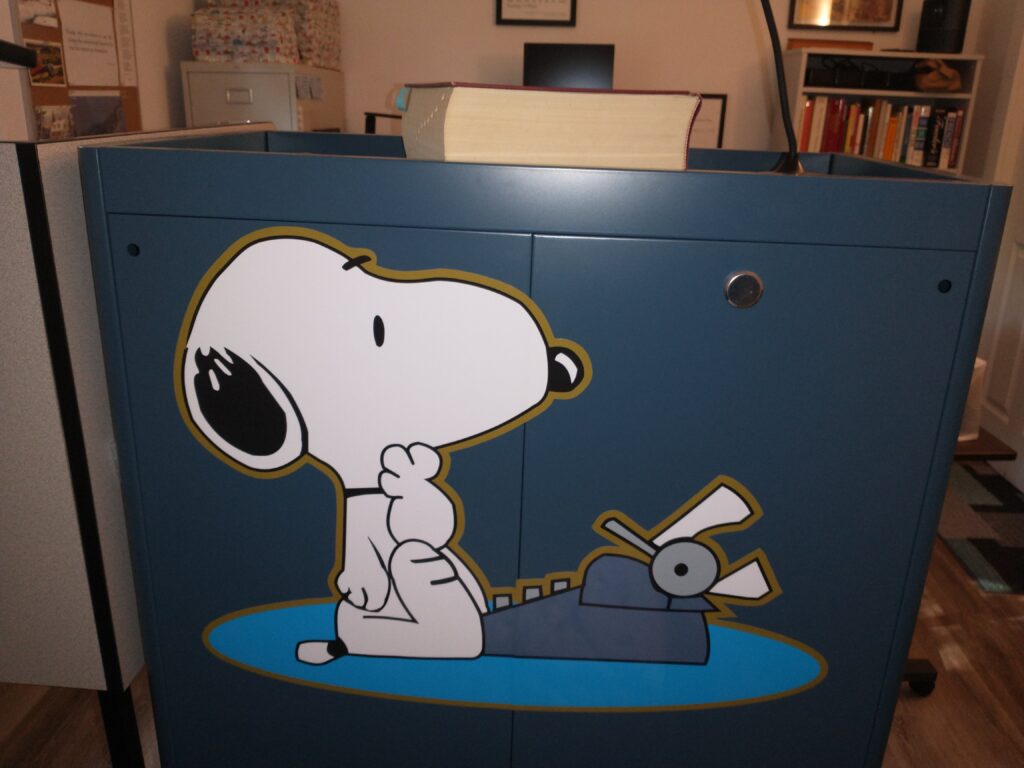 I don’t mean for there to be violins playing in the background while I tell you all of this; my aim is not to get pity from readers and future readers of Bodaciously; I simply want to communicate just how indescribably hard writing and putting these nine books together has been. All of my other books have been like Wikipedia entries compared to this 9-book episodic novel. I realize now that everything I’ve written before this has merely been training for this one—the big one.
I don’t mean for there to be violins playing in the background while I tell you all of this; my aim is not to get pity from readers and future readers of Bodaciously; I simply want to communicate just how indescribably hard writing and putting these nine books together has been. All of my other books have been like Wikipedia entries compared to this 9-book episodic novel. I realize now that everything I’ve written before this has merely been training for this one—the big one.
Let’s take typesetting or layout of the book in InDesign for example. Before I started the layout process, I read books on book design, typography, fonts, and a primer on basic principles of graphic design. Then, I had to teach myself the program, relying only on LinkedIn Learning videos which tend to be very good, or YouTube videos, many of which are produced by self-purported experts in these fields, and I’m here to tell you that the ones who are good at this, that is the ones who are not just good with the applications but are also good teachers, are rare.
I spent hours upon hours seeking out straightforward answers on how to do certain basic things in page layout using the program, and what I discovered is that if there are straightforward answers, for the most part the people in the know don’t want to share their knowledge—even if you offer to pay them for it. I couldn’t even find resources on the Adobe website instructing me on how to do some of these layout functions, which brings up an entirely different topic, which is how the creators of computer applications have universally absolved themselves of teaching people how to use their products by sloughing them off to the software product’s “community” and having them give unclear and self-aggrandizing answers, merely to show off their mastery of this ultimately recondite and meaningless little fiefdom that is Adobe InDesign or any other computer application.
This all reminds me of a brief period some 20 years ago when I tried to participate in a “writer’s forum”—think of it as a pre-Reddit online community where would-be writers got together ostensibly to share their knowledge. What I discovered back then (and was reminded of recently) was this: while there are a few very knowledgeable people on these forums, for the most part the forums are controlled by people who just like being the expert—the lords of their little fiefdoms, the big fish in their own little ponds. Most of these people aren’t actually writing books or at least books worth a damn, and I know they aren’t because if they were, they wouldn’t have the time to be seemingly ubiquitous on these forums, vociferously arguing the merits of InDesign vs. Quark Xpress, and whether to write on their MacBook or Freewrite Traveler “smart typewriter” when they’re writing/making performance art in their local Starbucks.
Most of these people aren’t actually writing books or at least books worth a damn, and I know they aren’t because if they were, they wouldn’t have the time to be seemingly ubiquitous on these forums, vociferously arguing the merits of InDesign vs. Quark Xpress, and whether to write on their MacBook or Freewrite Traveler “smart typewriter” when they’re writing/making performance art in their local Starbucks.
They remind me of a favorite quote by Ernest Hemingway: “Back when I was learning to write, the big debate was on the spelling of altogether—should it be ‘altogether’ or ‘all together,’ one word or two? How’d that turn out anyway?”
God, how I love that quote.
Here’s the deal: I’m a guy who grew up with computers, at a time when computers were tools, and the function of a software application—they were called business productivity applications, like word processing, databases, and spreadsheets—was to get a job done. In other words, just friggin’ work, bitch. What I’ve learned, not just in the five weeks I’ve been working with Adobe InDesign, but also in the 30-plus years that I have been a user of Microsoft Word, is that increasingly software companies are becoming like casinos; they just want to keep you at the table; because the longer you’re in their casino—this case their online universe, the greater their application’s legitimacy, and the greater control they maintain over the product. I don’t want to get too much into this, but the bottom line is, for a guy like me—a writer who spends a decade writing a book first on typewriters and then in a word processing program—I’m not interested in the minutiae; I don’t get my jollies from knowing the arcane nomenclature, syntax, functionality, keyboard shortcuts; I just want to get the thing done and done right.
These companies have made these products so insanely complicated when they really don’t need to be, that I predict within 5 years AI is going to be doing 90% of all book layout functions. As I’ve often said to my best friend Jason Scott, who enticed me out of my writing cocoon about a year ago to introduce me to AI graphics and music, and eventually AI like ChatGPT and Claude, the day that these companies come out with a reasonably priced AI/robot assistant (about the cost of an early Macintosh, let’s say, which was about $2,500 in 1984)—I will be among the first people in line for such a product.
I would love to have my very own assistant who would not write anything for me, or edit anything for me, but to which I could give my finished manuscript and have it proofread the entire thing, give me a report on mistakes in spelling or punctuation, and not fix them for me but inform me of where they are in the text so I can do it. I would also like this robot / AI assistant to handle a number of the maddening aspects of producing books like, as I am discovering, typesetting and layout.
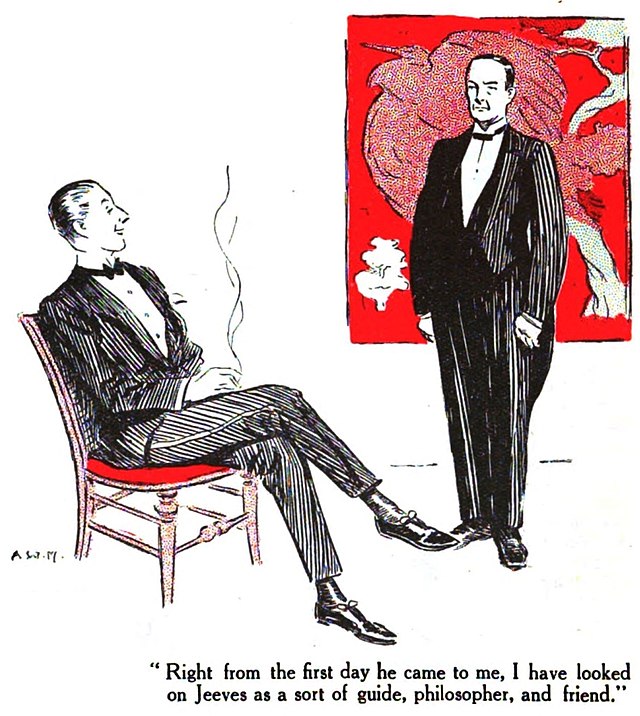 I would love to be able to give my robot / AI assistant the completely finished manuscript and just say to it, “All right, Jeeves (how I address ChatGPT, as an homage to the Wodehouse novels and the long defunct search engine), here’s my finished book. It’s going to be in a 6 by 9 trim size, I want it to have three-quarter-inch margins all around, it will have footnotes and running headers that alternate between my name and the title of the series, and my name and the title of the episode, and I want the copyright page to say such and such, and here are the ISBN numbers, and here is the text for the about the author page at the back, and just go friggin’ typeset the book so that it’s motherf-cking perfect. I want you to do all of the calculations about hyphenation, justification, word spacing, tracking, glyphs, all of that maddening crap; I don’t want to know how you do it, I don’t want to have to learn how to write GREP expressions; I just want you to churn and burn, Jeeves, and take my finished manuscript of gorgeous prose and turn it into a beautiful, eminently readable book.”
I would love to be able to give my robot / AI assistant the completely finished manuscript and just say to it, “All right, Jeeves (how I address ChatGPT, as an homage to the Wodehouse novels and the long defunct search engine), here’s my finished book. It’s going to be in a 6 by 9 trim size, I want it to have three-quarter-inch margins all around, it will have footnotes and running headers that alternate between my name and the title of the series, and my name and the title of the episode, and I want the copyright page to say such and such, and here are the ISBN numbers, and here is the text for the about the author page at the back, and just go friggin’ typeset the book so that it’s motherf-cking perfect. I want you to do all of the calculations about hyphenation, justification, word spacing, tracking, glyphs, all of that maddening crap; I don’t want to know how you do it, I don’t want to have to learn how to write GREP expressions; I just want you to churn and burn, Jeeves, and take my finished manuscript of gorgeous prose and turn it into a beautiful, eminently readable book.”
Sigh. Alas, maybe someday.
In the meantime, I’ve had to learn all of this stuff myself, and while I have enjoyed the challenge of it, in that it’s like learning a new language—something for which I’ve discovered I have a natural aptitude—it’s been incredibly frustrating to have to ferret out the answers of how to do basic things in Adobe InDesign, relying on a lot of mediocre videos by so-called experts, and having to ask questions of ChatGPT because asking those same questions in a Google search prompt gives you literally a google of irrelevant and useless answers. But I’ve discovered that with ChatGPT and other AI systems, they’re wrong more than they’re right.
For example, I would ask one of these systems to give me a step-by-step process for transferring styles between InDesign documents, and time and again, even though I asked very precise, very clear questions (I studied philosophy in college, where clarity in writing is paramount), it would often send me down the incorrect path, forcing me to double-back and change everything to the correct way of doing it. I don’t want to bore you with every detail of every example of every problem that I encountered; all I want to say is this: anybody who thinks AI is going to take over the world anytime soon is a 100% unmitigated moron. (These are probably the same people characterized in this bon mot by my friend Jason: “Stephen Fry is a dumb person’s idea of a smart person.”) The only way I can see AI taking over is if there aren’t adequate governing controls put in place to prevent a high-IQ toddler from wrecking the internet.
(By the way, to any would-be snarky troll/hater/jealous wannabe writer out there who attempts to insinuate that a single word of Bodaciously was written by AI, I have three things to say. 1. I wrote 95 percent of this book before AI was publicly available or even viable. 2. If you libel me in any way, I will sue you so hard, your great-grandchildren will have to sell their hair in order to eat. 3. AI couldn’t do what I’ve done; Bodaciously’s 1.2-million words would motherf-cking BREAK AI.)
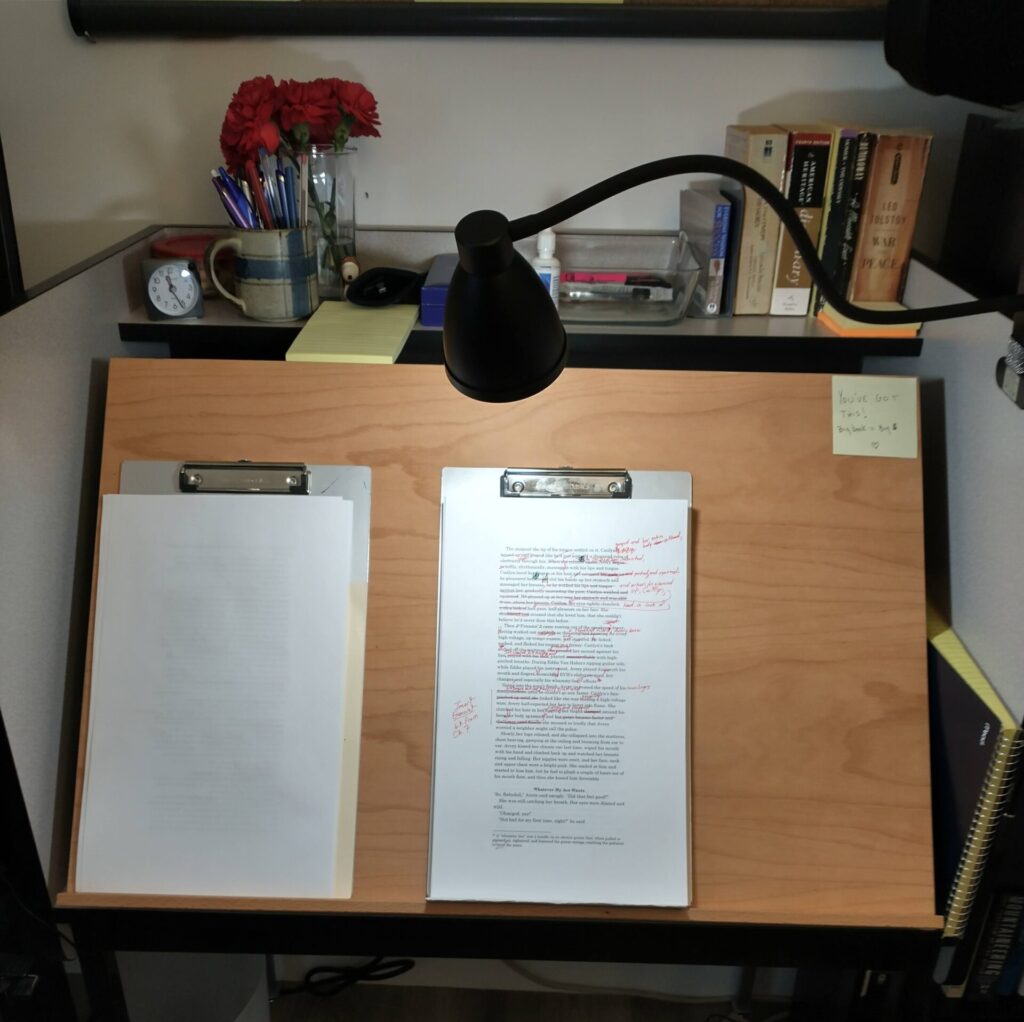 I appreciate your bearing with me as I unload myself of these frustrations that have been weighing on me for the past year. I guess what I’m trying to say is this: I love writing—creating drafts, revising them at my drawing board, proofing them, consulting thesauri, dictionaries, visual dictionaries, copy editor’s handbooks, Fowler’s Usage, The Chicago Manual of Style, and other reference works, just doing everything to get the words right—that is what I love. What I don’t love are all of these things that have nothing to do with getting the words right, like trying to condense your 1.2 million word, 9-episode epic novel into 150 words so it fits on the back inside jacket of a hardcover or the back cover of a trade paperback, or having to parse marketing gobbledygook from another marketing mountebank, or listening to hyped-up bullcrap from a publicity person who talks a big game but then doesn’t have the decency to get back to you with a quote.
I appreciate your bearing with me as I unload myself of these frustrations that have been weighing on me for the past year. I guess what I’m trying to say is this: I love writing—creating drafts, revising them at my drawing board, proofing them, consulting thesauri, dictionaries, visual dictionaries, copy editor’s handbooks, Fowler’s Usage, The Chicago Manual of Style, and other reference works, just doing everything to get the words right—that is what I love. What I don’t love are all of these things that have nothing to do with getting the words right, like trying to condense your 1.2 million word, 9-episode epic novel into 150 words so it fits on the back inside jacket of a hardcover or the back cover of a trade paperback, or having to parse marketing gobbledygook from another marketing mountebank, or listening to hyped-up bullcrap from a publicity person who talks a big game but then doesn’t have the decency to get back to you with a quote.
As I dictate this blog entry while walking on my treadmill, I realize that I’m going to have to let this other stuff go and just focus on the words, and making these nine books the absolute best I can make them. Years ago, when Leonardo DiCaprio was coming out with his labor of love movie The Revenant, the morning after its release I was reading the newspaper in the Millbrook Diner and came upon a quote by DiCaprio about the movie. I’ve since been unable to find the exact quote, but it made such an impression on me that I wrote it down in one of my notebooks. He said, “All you can do is produce the best work you can. All the rest of it [awards, sales, etc.] is out of your control.”
Lately, I haven’t been sleeping very well because of worries about all of the aspects of book production; the fact that I have eight more episodes to finish after this one; the fact that I need to send out advance reading copies (ARCs) to reviewers this summer; the fact that as a result of my Operation Bodacious Bestseller fundraising campaign I have received tens of thousands of dollars from people who believe in me and whom I do not want to let down; and the myriad other details that go hand in hand with being a maverick, an auteur with incredibly high standards. It’s a lot.
And I’m not ashamed to admit, that I haven’t done it by myself; call it God, the Universe, Spirit, the Force, or Bob’s Big Boy, but I’ve prayed every morning for the past 10 years, especially in the past 2 years, for answers on how to do such and such related to the book, and whether or not you believe in Bob’s Big Boy or the Force or God, or whether or not any of these entities exist, when I’ve asked, the answers have come.
I’m not trying to proselytize anyone here; I’m merely pointing out that I have not done this by myself; indeed, had I had to do it all myself, I would have kept drinking and not gotten sober as I did seven years ago.
So, what’s next? Well, the photo shoot for my author photo is in two weeks. I need to find a credible, accomplished publicity firm, a digital marketer, a booker, and a social media person and get them lined up. (If you are such a professional, and not another fast-talking flimflam man, please Contact Me.) I need to finalize Episode I and send it to the printers to produce ARCs to get advance reviews. I need to send my backers a report. So … I can’t back out now. There have been some mornings when I’ve wanted to throw the entire book into a 50-gallon drum and burn it. There have been other mornings when I’ve thought that I want to simply finish it, put it in a footlocker, lock it up, and leave it for my heirs to publish and deal with (these have traditionally been referred to as “trunk writers”).
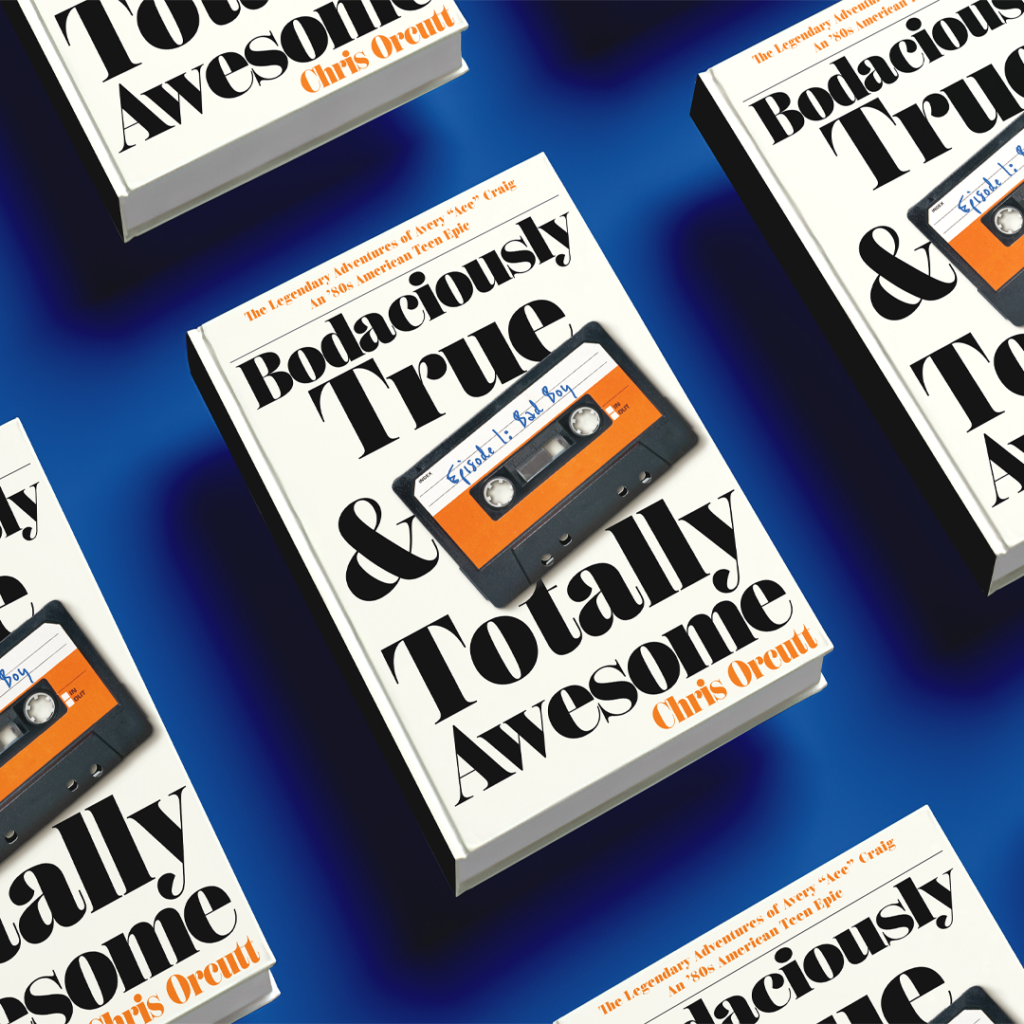 But … fortunately there have been more mornings when I’ve woken up and felt I was on a mission, a mission to bring my generation (idiotically dubbed “Generation X” from this obscure book on the class system in America), an authentic, detailed, fearless story about what it was to be a suburban teen in the 1980s, filling the pages with the music, the fashion, the lingo, the TV, the movies, and the cultural and historical events so that that time that we all experienced is not forgotten. I genuinely believe it was the best time in the history of America to be a teenager. What’s more is, while the books were never going to be as great and as pitch perfect as my initial vision was for them, they’re pretty damn close. They’re fun, dramatic, adventurous, spicy, factually correct, emotionally true, and no holds barred—in the areas of sexual awakening, family dynamics, and teen romantic relationships.
But … fortunately there have been more mornings when I’ve woken up and felt I was on a mission, a mission to bring my generation (idiotically dubbed “Generation X” from this obscure book on the class system in America), an authentic, detailed, fearless story about what it was to be a suburban teen in the 1980s, filling the pages with the music, the fashion, the lingo, the TV, the movies, and the cultural and historical events so that that time that we all experienced is not forgotten. I genuinely believe it was the best time in the history of America to be a teenager. What’s more is, while the books were never going to be as great and as pitch perfect as my initial vision was for them, they’re pretty damn close. They’re fun, dramatic, adventurous, spicy, factually correct, emotionally true, and no holds barred—in the areas of sexual awakening, family dynamics, and teen romantic relationships.
I’d like readers to know up front here, and by readers I’m also referring to potential reviewers of Bodaciously, that because this is one giant novel split into nine parts, they need to reserve full judgment of Bodaciously for when the 9th installment is published in November of 2027. The point is, that there are a lot of long, long, long on-ramps—with characters, with situations, with plot points, with foreshadowed elements—things that do not get resolved immediately, and instead carry into later episodes before they’re resolved. What I’m attempting here has not been done since Proust’s Remembrance of Things Past; although, having read some of Remembrance I can say that Bodaciously is profoundly more readable and entertaining.
(By the way, my wife calls Bodaciously … Remembrance of Things Past meets Ferris Bueller’s Day Off. I call Bodaciously what you get when you put War and Peace, The Odyssey, and Fast Times at Ridgemont High into a supercollider and smash them together.)
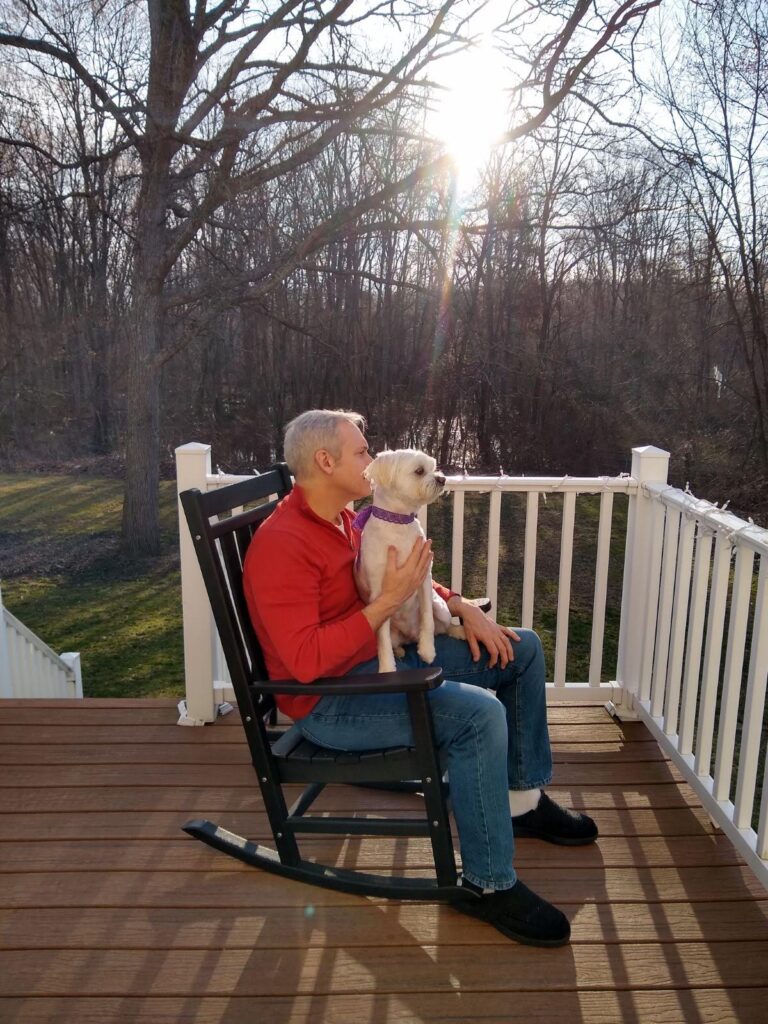 It’s almost May 20, which puts me 8 months away from publication of Episode I. Let me tell you, having been through these self-imposed deadlines before (I actually have a countdown clock that I reset each time I finish an aspect of the project), those months are going to fly by.
It’s almost May 20, which puts me 8 months away from publication of Episode I. Let me tell you, having been through these self-imposed deadlines before (I actually have a countdown clock that I reset each time I finish an aspect of the project), those months are going to fly by.
Over the past decade, most of the time I’ve felt insane to even be trying to do this. It has felt utterly impossible—so much so that three or four years ago I wrote a quote on my whiteboard in my office, a quote by Nelson Mandela:
“It always seems impossible until it’s done.”
I cannot tell you how much I’m looking forward to December 2027 when Bodaciously is done, and I can read Mandela’s quote and know that I did it—I saw it through to the end and accomplished the impossible.
* * *
Postscript:
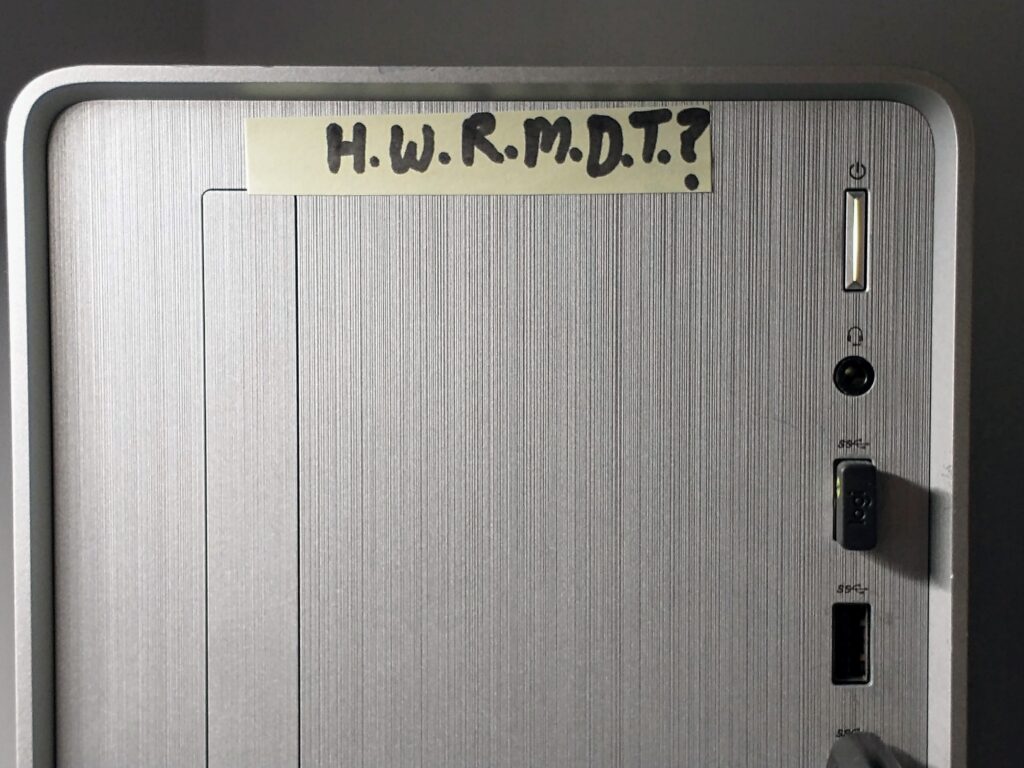
A cryptic Post-It note on my computer reads, “H.W.R.M.D.T.?” It’s an acronym for “How Would Reinhold Messner Do This?” In 1980, Reinhold Messner was the first man to climb Mount Everest solo and without using bottled oxygen. Anytime I get stuck or frustrated with the book, I look at that Post-It note and ask myself that question, and the answer that invariably comes back to me is that whatever problem he faced, he’d look at it as a challenge, and he’d meet the challenge with joy and enthusiasm.
Comments (0)